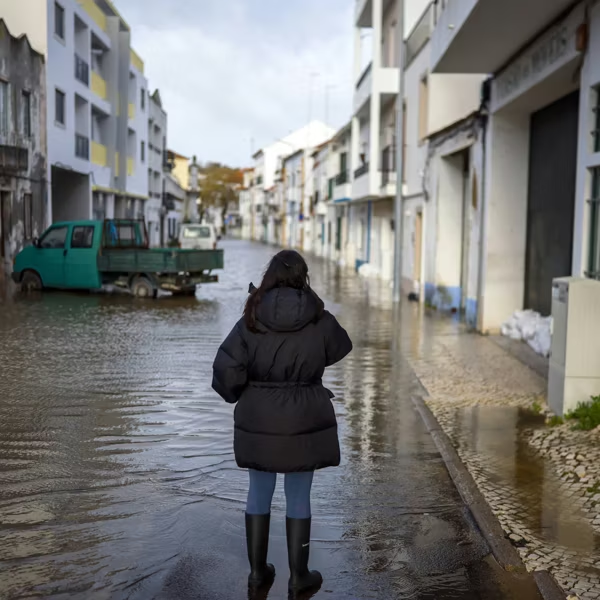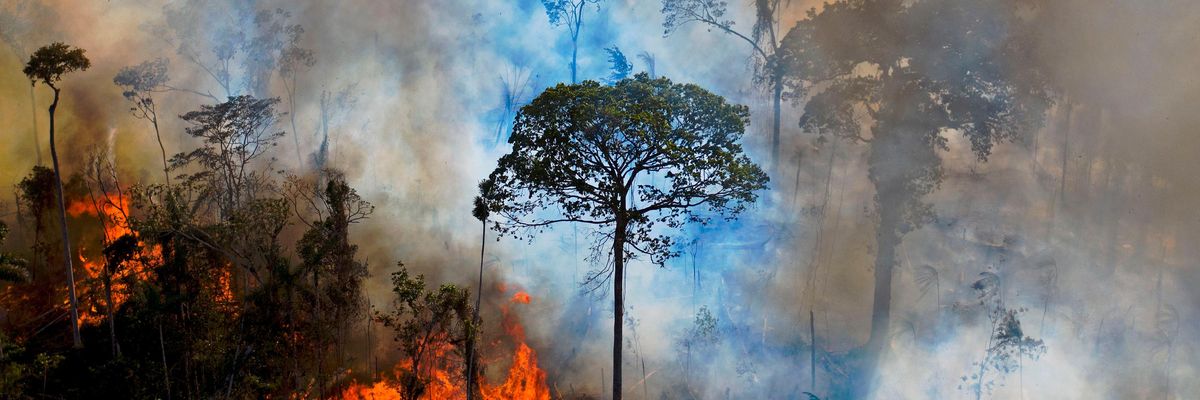Surpassing the global temperature targets of the Paris climate agreement, even temporarily, could dramatically increase the risk of the world experiencing dangerous "tipping points," according to research published Friday.
The Intergovernmental Panel on Climate Change (IPCC) defines tipping points as "critical thresholds in a system that, when exceeded,
can lead to a significant change in the state of the system, often with an
understanding that the change is irreversible."
Published in the journal Nature Climate Change, the new study focuses on the potential shutdown of the Atlantic Meridional Overturning Circulation (AMOC), the Amazon rainforest shifting to savannah, and the collapse of the Greenland and West Antarctic ice sheets.
"Our model analysis reveals that temporary overshoots can increase tipping risks by up to 72%."
Under the 2015 Paris deal, governments agreed to work toward keeping global temperature rise this century below 2°C, ultimately aiming for limiting it to 1.5°C. However, scientists continue to warn the countries' pledges and actions to cut planet-heating emissions are far from bold enough to reach those goals, and critics blasted the COP27 summit in Egypt last month as "another terrible failure" given that the conference's final agreement did not call for rapidly phasing out all fossil fuels.
"To effectively prevent all tipping risks, the global mean temperature increase would need to be limited to no more than 1°C—we are currently already at about 1.2°C," noted study co-author Jonathan Donges, co-lead of the FutureLab on Earth Resilience in the Anthropocene at the Potsdam Institute for Climate Impact Research (PIK). "The latest IPCC report is showing that we're most likely on a path to temporarily overshoot the 1.5°C temperature threshold."
The researchers examined various scenarios with peak temperatures from 2°C to 4°C. As lead author and PIK scientist Nico Wunderling explained, they found that "the risk for some tipping events could increase very substantially under certain global warming overshoot scenarios."
"Even if we would manage to limit global warming to 1.5°C after an overshoot of more than 2°C, this would not be enough as the risk of triggering one or more global tipping points would still be more than 50%," Wunderling said. "With more warming in the long-term, the risks increase dramatically."
"We found that the risk for the emergence of at least one tipping event increases with rising peak temperatures—already at a peak temperature of 3°C, more than one-third of all simulations showed a tipping event even when overshoot durations were limited strongly," he added. "At 4°C peak temperature, this risk extends to more than half of all simulations."
According to the study, "Our model analysis reveals that temporary overshoots can increase tipping risks by up to 72% compared with non-overshoot scenarios, even when the long-term equilibrium temperature stabilizes within the Paris range."
Study co-author Ricarda Winkelmann, co-lead of the FutureLab on Earth Resilience in the Anthropocene at PIK, pointed out that "especially the Greenland and the West Antarctic ice sheet are at risk of tipping even for small overshoots, underlining that they are among the most vulnerable tipping elements."
"While it would take a long time for the ice loss to fully unfold, the temperature levels at which such changes are triggered could already be reached soon," she said. "Our action in the coming years can thus decide the future trajectory of the ice sheets for centuries or even millennia to come."
While these scientists found that the Amazon and AMOC have higher critical temperature thresholds, various studies have highlighted the dangers of either system reaching its tipping point.
An analysis of the Amazon released in September by scientists and Indigenous leaders in South America stated that "the tipping point is not a future scenario but rather a stage already present in some areas of the region," meaning portions of the crucial rainforest may never recover—which could have "profound" consequences on a global scale.
A study on the AMOC from last year, also published in Nature Climate Change, warned that the collapse of the system of currents that carries warm water from the tropics to the North Atlantic "would have severe impacts on the global climate system," from disrupting rains that billions of people need for food and increasing storms to further threatening the Amazon and ice sheets.
Donges stressed that "even though a temporary temperature overshoot would definitely be better than reaching a peak temperature and remaining there, some of the overshoot impacts may lead to irreversible damages in a high climate risk zone and this is why low-temperature overshoots are key here."
Pointing to estimates that current policies could lead to an average global temperature of up to 3.6°C by 2100, Donges declared that "this is not enough."
As Winkelmann put it: "Every tenth of a degree counts. We must do what we can to limit global warming as quickly as possible."




